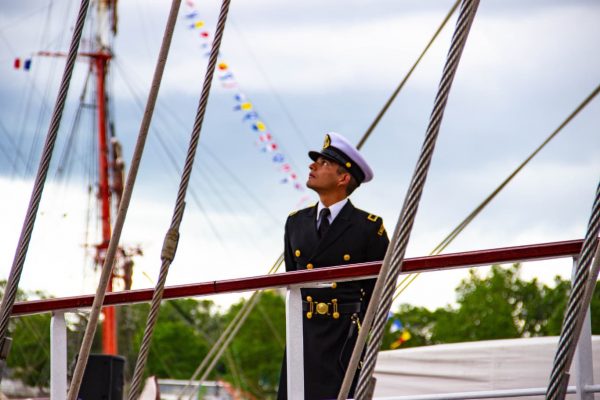What is an Electrotechnical Officer?
An Electrotechnical Officer (ETO) in the merchant navy is responsible for maintaining and repairing the ship’s electrical systems and equipment. This includes generators, motors, lighting, navigation and communication systems, and other electrical equipment. ETOs work closely with the ship’s engineers to ensure that the electrical systems operate correctly and safely. They also may be responsible for managing and supervising other crew members who assist with electrical maintenance and repair.
Electrotechnical Officers (ETOs) in the merchant navy typically work on merchant ships, including cargo ships, tanker ships, container ships, and other commercial vessels. Organisations such as shipping lines, freight companies, and government agencies can operate these ships. ETOs may work on ships that travel to various destinations, including ports in different countries and remote locations. They may also spend extended periods at sea, away from their homes and families, depending on the duration of the voyage.
Electrotechncial Offficer Comand Hyrachy
The ship’s chief engineer typically manages the Electrotechnical Officer (ETO) on a merchant navy vessel. The chief engineer oversees the operation and maintenance of the ship’s engineering systems and equipment, including the electrical systems and equipment. The ETO works under the direction of the chief engineer and may be responsible for managing and supervising other crew members who assist with electrical maintenance and repair.
The ETO also reports to the captain of the vessel and may be involved in decision-making for the vessel’s electrical maintenance and repair operations, as well as providing information about the electrical systems and equipment to the captain. It’s important to note that the roles and responsibilities of the ETO may vary depending on the size and type of vessel and the specific requirements of the company or organisation that operates the ship.
How to Become an Electrotechnical Office in the Merchant Navy
There are different routes to becoming an Electrotechnical Officer (ETO) in the merchant navy. Still, typically the process involves completing a combination of education and training and gaining relevant work experience. Some of the steps that may be involved in becoming an ETO include the following:
Education: To qualify as an ETO, you typically need a good education in mathematics, physics and electrical engineering. You may be required to have a college diploma or degree in electrical engineering or a related field.
Training: You will also need to complete a specific training program approved by the maritime regulatory authority in your country, such as the STCW (Standards of Training, Certification, and Watchkeeping) in the case of the United States.
On-board experience: You will also need to gain experience working on board ships, including experience with electrical systems and equipment. This can be achieved by working as an electrician or electrical technician on board ships or by participating in an approved shipboard training program.
Certification: Once you have completed the required education, training, and work experience, you will need to be certified by the maritime regulatory authority in your country. This may involve passing exams and meeting other requirements, such as undergoing medical evaluations.
Maintaining your certification: To maintain your certification, you will need to complete continuing education and training and meet other requirements per the laws and regulations of the country you are working in.
It’s important to note that the requirements and procedures to become an ETO may vary depending on the country you are in, so it’s a good idea to check the specific requirements of your country’s maritime regulatory authority.
Skills and Attribute of Electrotechnical Officers
To be a successful Electrotechnical Officer (ETO) in the merchant navy, one should possess technical and non-technical skills and attributes. Here are some of the key skills and attributes that are typically required for this role:
Technical skills: ETOs should have a strong understanding of electrical systems and equipment, including generators, motors, lighting, navigation and communication systems, and other electrical equipment. They should know electrical engineering principles and be able to diagnose and troubleshoot problems with these systems.
Leadership skills: ETOs may manage and supervise other crew members who assist with electrical maintenance and repair. Therefore, good leadership and management skills are essential.
Communication skills: ETOs must be able to effectively communicate with other crew members and officers and with shore-based personnel, such as shipyard workers and suppliers.
English language skills: English is the standard language used for communication in the maritime industry, and it is important that electrotechnical officers can speak fluent English. This is typically proven via certification such as the Marlins English Test.
Problem-solving skills: ETOs must think critically and solve problems quickly and effectively, especially in emergencies.
Flexibility and adaptability: ETOs may be required to work in various environments and conditions and may have to adapt to changing circumstances and priorities.
Physical fitness: ETOs must be in good physical condition, as the job can be physically demanding and may involve working in tight spaces and at heights.
Attention to detail: ETOs must be able to pay close attention to detail, as even small errors or oversights can have serious consequences.
Safety-consciousness: ETOs must comply with safety regulations and procedures to ensure the safety of themselves and others.
It’s also important to note that ETOs must also be able to work well under pressure, be able to work independently and as part of a team and maintain their certifications as required by the maritime regulatory authority of the country they are working in.
Career Opportunities for Electrotechnical Officers
Career Opportunities As A Electrotechnical In the Merchant Navy
As an Electrotechnical Officer (ETO) in the merchant navy, several different career opportunities are available, depending on your interests, skills, and experience. Some possible career paths include:
Shipboard positions: ETOs can work on various types of ships, including cargo ships, tanker ships, container ships, and other commercial vessels. They may progress to higher-level positions such as chief ETO or chief engineer.
Shore-based positions: ETOs can also work in shore-based roles, such as marine engineering consultants, surveyors, or shipyards. They can also work in positions such as electrical maintenance supervisors in ports, harbours or offshore platforms.
Teaching and training: ETOs with a high level of experience and knowledge can also become instructors or trainers, teaching and training the next generation of merchant navy officers and crew members.
Marine research: ETOs with specialised knowledge and experience can also pursue careers in marine research, working for organisations such as universities, government agencies, or private companies.
Advancement: With experience and additional training, ETOs can advance to positions of increased responsibility and leadership, such as a chief engineer or chief of the engineering department.
It’s also important to note that many ETOs also have opportunities to work on various ships, sail to different ports and countries, and work on different types of vessels and companies. The career opportunities are diverse, and the ETOs have a range of opportunities to choose from.
Opportunities For Electrotechncial Officers Beyond The Merchant Navy
Electrotechnical Officers (ETOs) in the merchant navy have a wide range of skills and experience that are highly valued in many industries beyond the merchant navy. Some possible career opportunities for ETOs beyond the merchant navy include the following:
Marine engineering: ETOs can work in marine engineering roles for companies that design, build, or maintain ships and other marine vessels.
Industrial electrical engineering: ETOs can work in industrial electrical engineering roles for companies that operate power plants, factories, and other industrial facilities.
Offshore engineering: ETOs can work in offshore engineering roles for companies that operate oil and gas platforms and other offshore facilities.
Electrical consulting: ETOs can work as electrical consultants, providing expert advice and consulting services to companies and organisations in various industries.
Renewable energy: ETOs can work in renewable energy roles for companies that design, build and maintain wind turbines, solar arrays and other renewable energy systems.
Electrical maintenance and repair: ETOs can also work in electrical maintenance and repair roles in various industries, such as manufacturing, mining, and construction.
Power generation and distribution: ETOs can work in power generation and distribution roles for companies that generate and distribute electricity to homes and businesses.
Government agencies: ETOs can work for government agencies such as coast guards, naval forces and other maritime regulatory bodies.
It’s also important to note that many ETOs also have opportunities to work in research and development and management and leadership roles. The skills and knowledge that ETOs gain in the merchant navy are highly transferable to many different industries, and many ETOs can find rewarding and challenging careers beyond the merchant navy.
How Much Do Electrotechnical Officers Make In The UK?
The salary for Electrotechnical Officers (ETOs) in the merchant navy can vary depending on factors such as the type of ship, the company, and the individual’s experience level and qualifications. However, as a rough guide, ETOs in the merchant navy in the UK can expect to earn a salary in the range of £30,000 to £60,000 per year.
Junior ETO: A junior ETO, who is just starting in their career, can expect to earn a salary in the range of £25,000 to £35,000 per year.
Senior ETO: A senior ETO, who has several years of experience and has advanced to a higher level of responsibility and leadership, can expect to earn a salary in the range of £40,000 to £50,000 per year.
Master ETO: A Master ETO, the most senior and experienced officer on the ship, can expect to earn a salary in the range of £50,000 to £70,000 per year.
It’s important to note that ETOs in the merchant navy are typically paid based on salary and overtime. They may also receive additional pay for working on long voyages or in challenging environments. Some companies also offer bonuses, benefits and other incentives to ETOs, which can add to the total compensation package.
It’s also important to note that, in the merchant navy, you are also away from home for long periods, and it’s not for everyone. The compensation package is usually built to cater for the time away from home. Still, it’s essential to have a good understanding of the lifestyle and the compensation structure before deciding to pursue this career path.
It’s also worth noting that the salary figures can vary depending on the company and the role you are working on. For example, an ETO working on a cruise ship may earn a higher salary than an ETO working on a cargo ship. Furthermore, the salary figures can vary depending on the level of experience and qualifications an individual holds.
Become an Electrotechnical Officer Cadet In The UK
Here are a few ways to find an Electrotechnical Officer (ETO) cadetship in the UK:
Visit shipping companies’ websites: Many shipping companies, such as P&O, Maersk, and CMA CGM, have their own cadet programs and offer ETO cadetships. You can visit their websites to learn more about the program and how to apply.
Check with maritime training providers: Many maritime training providers offer ETO cadetships in partnership with shipping companies. You can visit these providers’ websites to learn more about the programs they offer and how to apply.
Contact the UK Chamber of Shipping: The UK Chamber of Shipping is the trade association for the UK shipping industry. They can provide information about ETO cadetships and connect you with shipping companies currently offering cadetships.
Check for online job portals: You can also search for ETO cadetship opportunities on online job portals, such as LinkedIn, Indeed, and Reed.
Attend career fairs or other industry events: Attending career fairs or other industry events, such as maritime and maritime engineering events, is an excellent way to learn about ETO cadetships, meet with industry professionals and get more information.
It’s important to note that the requirements and application process for ETO cadetships can vary depending on the company and the program, so it’s essential to read the information carefully and follow the instructions provided.




